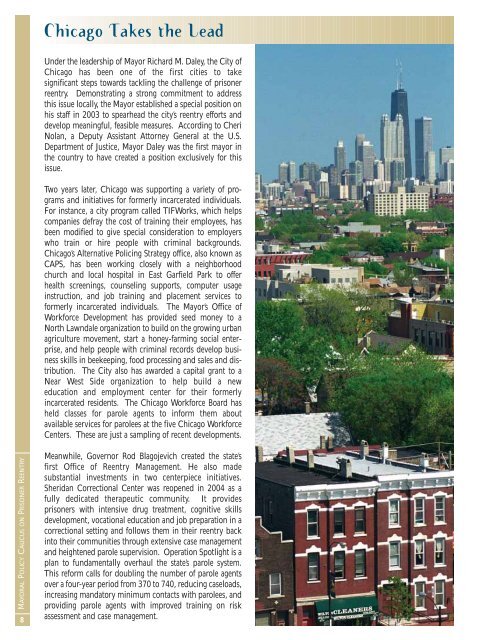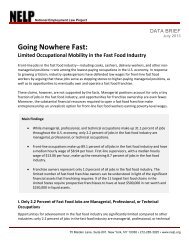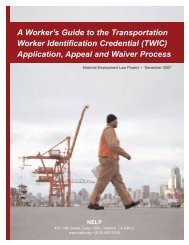Rebuilding Lives. Strengthening Communities.
Rebuilding Lives. Strengthening Communities.
Rebuilding Lives. Strengthening Communities.
You also want an ePaper? Increase the reach of your titles
YUMPU automatically turns print PDFs into web optimized ePapers that Google loves.
Chicago Takes the Lead<br />
Under the leadership of Mayor Richard M. Daley, the City of<br />
Chicago has been one of the first cities to take<br />
significant steps towards tackling the challenge of prisoner<br />
reentry. Demonstrating a strong commitment to address<br />
this issue locally, the Mayor established a special position on<br />
his staff in 2003 to spearhead the city’s reentry efforts and<br />
develop meaningful, feasible measures. According to Cheri<br />
Nolan, a Deputy Assistant Attorney General at the U.S.<br />
Department of Justice, Mayor Daley was the first mayor in<br />
the country to have created a position exclusively for this<br />
issue.<br />
Two years later, Chicago was supporting a variety of programs<br />
and initiatives for formerly incarcerated individuals.<br />
For instance, a city program called TIFWorks, which helps<br />
companies defray the cost of training their employees, has<br />
been modified to give special consideration to employers<br />
who train or hire people with criminal backgrounds.<br />
Chicago’s Alternative Policing Strategy office, also known as<br />
CAPS, has been working closely with a neighborhood<br />
church and local hospital in East Garfield Park to offer<br />
health screenings, counseling supports, computer usage<br />
instruction, and job training and placement services to<br />
formerly incarcerated individuals. The Mayor’s Office of<br />
Workforce Development has provided seed money to a<br />
North Lawndale organization to build on the growing urban<br />
agriculture movement, start a honey-farming social enterprise,<br />
and help people with criminal records develop business<br />
skills in beekeeping, food processing and sales and distribution.<br />
The City also has awarded a capital grant to a<br />
Near West Side organization to help build a new<br />
education and employment center for their formerly<br />
incarcerated residents. The Chicago Workforce Board has<br />
held classes for parole agents to inform them about<br />
available services for parolees at the five Chicago Workforce<br />
Centers. These are just a sampling of recent developments.<br />
MAYORAL POLICY CAUCUS ON PRISONER REENTRY<br />
8<br />
Meanwhile, Governor Rod Blagojevich created the state’s<br />
first Office of Reentry Management. He also made<br />
substantial investments in two centerpiece initiatives.<br />
Sheridan Correctional Center was reopened in 2004 as a<br />
fully dedicated therapeutic community. It provides<br />
prisoners with intensive drug treatment, cognitive skills<br />
development, vocational education and job preparation in a<br />
correctional setting and follows them in their reentry back<br />
into their communities through extensive case management<br />
and heightened parole supervision. Operation Spotlight is a<br />
plan to fundamentally overhaul the state’s parole system.<br />
This reform calls for doubling the number of parole agents<br />
over a four-year period from 370 to 740, reducing caseloads,<br />
increasing mandatory minimum contacts with parolees, and<br />
providing parole agents with improved training on risk<br />
assessment and case management.
















